This is a reader-supported publication. I give it all away for free but could really use your support if you want me to keep doing this.
For someone who has both studied and taught Marxism, as well as the history of the communist movement and the socialist bloc (with a master’s from no less a Red bastion than the “Kremlin on the Charles” [Harvard]), the impulse to cast Trump as a capitalist variant of Mao is just too strong to ignore.
Trump’s return to power in 2024, after four years of political ostracization and legal “persecution",” reminds one of Mao’s resurrected power through imposition of the Cultural Revolution (started in 1966), after his diminishment within the Party (1962-66) following the failures of the Great Leap Forward (1958-62).
For Mao, the primary target upon his return to power are the traitorous ideological types (to include Deng Xiaoping) who have “deeply” infiltrated the state in the manner of right-wing lunatics and have ruined both the revolution and the country.
For Trump, upon his return to power after the perceived debacle of his COVID response and his twin impeachments, the primary targets are the left-wing lunatics who have infiltrated the government and stolen control from the masses who need to rise up and take back their country and future.
Mao has his “four olds” to destroy — old customs, old culture, old habits, and old ideas; Trump has his “three news” to destroy — DEI (diversity, equity, inclusion). Both seek a spiritual cleansing of sorts — one that reasserts the nation’s racial superiority (Middle Kingdom, City on a Hill) by preserving its central identities.
As such, both leaders seek to pit the rural “good folk” against the “degenerate” urbanites. Farmers and factory workers are automatically good, city-dwellers automatically bad.
Both depict the nation’s capital as the center of all evil — needing a complete ideological makeover.
In both instances, expertise in general is suspect, thus the purging, across government and party ranks, of non-believers. For Mao, anti-intellectualism is the order of the day, with his Red Guards persecuting academics, teachers, and other intellectuals, deeming all knowledge and expertise to be infected with reactionary thinking. For Trump, all the same targets (academics, scientists, cultural elites) come into view, met with the attendant book bans and highly publicized and symbolic attacks on universities and educators. His version of the Red Guards are Musk’s DOGE army and the Tech Bros more generally: those youthful types allowed to smash everything in their paths in the cause of rooting out corruption and inefficiency (which are one in the same).
To keep things clear as to who was who, both movements adopt specific symbology (color red) and clothing (Mao’s caps versus Trump’s MAGA caps).
Mao has his viral Little Red Book full of his wisdom parceled out in bits and pieces, whereas Trump made Twitter and now relies on Truth Social.
Both leaders build a profound and pervasive personality cult, demanding unquestioning loyalty and using charismatic leadership to consolidate power. Enemies must not only be purged but publicly humiliated and hounded for their “sins.”
Despite both being obese old men, Trump and Mao demand from the media an almost hagiographic depiction of their persons, “proving” their almost superhuman physical traits.
Both men are celebrated as “infallible” — incapable of mistakes and thus right about everything.
Both leaders cultivate an image of extreme virility, and both view women primarily as instruments of male pleasure.
In their unabashedly paranoid view of politics, institutions of all sorts need to be deconstructed and rebuilt along appropriately ideological grounds — purged of “bad thought,” as it were. Mirroring Trump completely, Mao targets bureaucrats, intellectuals, and educational institutions, seeking to “bombard the headquarters” (see, Trump’s “flood the zone” tactic) and dismantle the administrative (or “deep”) state while rooting out its pernicious ties to higher education.
Culture itself needs policing in both instances. As one analyst noted in a compelling Medium piece that greatly informed this post:
Like Mao, Trump seeks to control culture. Mao and his wife, former actress Jiang Qing, dictated what forms of cultural expression were permitted and suppressed others. Trump has fired the leadership of The Kennedy Center for the Performing Arts and made himself chair, while ordering government departments and schools to expunge books and other content related to “Woke Ideology.”
Both movements are essentially right-wing populist in nature, and highly nationalistic. They both bluster at hyperbolic rates to the world at large, issuing implausible, stunningly over-the-top threats, while preferring to concentrate on the fight back home — or against the “enemy within.”
As such, both are wiling to suffer international isolation — even pariah status — to achieve their domestic ends.
Mao rounds up millions of suspect urbanites and relocates them to rural collective farms. Trump’s variant focuses on undocumented migrants, relocating them to overseas prisons or just plain dumping them in failed states. The intended effect is similar: instill fear throughout society and make it clear to any and all enemies that they can be driven out at a moment’s notice.
Both Trump and Mao are forced — per their unreal and unrealized national ambitions — to preach the virtue of economic sacrifice while nonetheless indulging in supremely lavish lifestyles. Trump has his golf resorts and now his luxury jet; Mao would mandate palaces be built for him wherever he traveled, even if he was to stay there for only one night.
Both rail against the power of the state and yet both seek to use it to reshape society — and particularly the military — in their preferred image.
Mao wants and needs to diminish all alternatives to his power; Trump does as well. Both want their rule extended to their deaths — and beyond, permanently preventing retrenchment in the wrong ideological direction.
Both are essentially nihilists, believing only in the righteousness of their own personal power. If something cannot be controlled, then it must be reduced to chaos — at whatever the cost to social stability or economic strength.
The desire for national self-sufficiency is profound in both instances. Mao’s Great Leap Forward is all about detaching the country from any outside dependencies. Trump seeks the same with his 360-degree tariff war designed to restrict all domestic consumption to products made within the nation’s borders.
Perhaps the most compelling comparison point is both leaders’ need to be the center of all attention and all praise all the time. Both men revel in such public displays.
The big difference between the two leaders and their respective situations is that America’s judicial branch is still operative and semi-independent while Mao faced no such pushback within China’s political system.
For now, that seems our Constitutional lifeline and it is a thin one.
But here’s one last comparison point that should cheer: Mao’s cult of personality and radical policies were so closely tied to his personal authority that, once he was gone, the movement lost its driving force and legitimacy.
I still fully expect the same to happen with Trump. The Republicans are a fractious lot — just as fractious as the Dems today. What I keep reminding myself: Trumpism is being implemented in a blitzkrieg manner, which means it can be eradicated at a similar pace — assuming America can find its own Deng Xiaoping.
From my mini-bio of Deng Xiaoping in the 75th anniversary issue of Esquire:
Most Influential People of the 21st Century
Deng Xiaoping: Chinese Communist leader, creator of modern China, dead
by Thomas P.M. Barnett
Esquire, October 2008, p. 146.
The 21st century will not belong to one region, much less one superpower. It will belong to the entire planet — a world made interdependent for the first time in human history. What drives all that connectivity is demand for a better life, and the one man most responsible for unleashing all that desire was Deng Xiaoping. You want to know why the price of just about everything in your world seems set by China? He is the guy to blame.
Five simple words said to have been spoken by Deng in 1979 got this party started: "To get rich is glorious." America might have gotten a big head start — 11 score and 12 years ago — with its unbridled "pursuit of happiness," but Deng's legendary formulation is how the rest of humanity will actually catch up. Between these two historic phrases, the world spent untold blood and treasure trying to come up with the magic formula for national economic success. But when China cast its vote for wealth creation through individual empowerment, all such history — as Francis Fukuyama famously wrote — essentially ended.
Because of Deng, globalization is no longer a choice, but a condition. Mikhail Gorbachev, celebrated for ending the cold war, closed the door on the 20th century through his miscalculations. By pursuing political reform before economic reform, he inadvertently dissolved the Soviet empire. Deng chose wisely, pursuing economic reform before political liberalization, and, in the farthest-reaching act of the 20th century, catapulted America's most precious gift to humanity — our American system-cum-globalization — into worldwide majority status.
None of this was preordained.
Deng Xiaoping survived the Long March, World War II, China's civil war, and multiple attempts by Mao Tse-tung himself to destroy him during the Cultural Revolution.
But when he survived Mao and achieved power in the early 1980s, Deng did the unthinkable: He dismantled Mao's dysfunctional socialist model, repudiating Marx without having to say so.
And now, the more Deng's system evolves, the more his legacy resembles that of Alexander Hamilton, a quintessentially 18th-century man whose greatest influence was felt in the 19th century with America's stunning rise.
Of course, to some, Deng Xiaoping will always remain the butcher of Tiananmen, but frankly, that's giving in to the fallacy that political freedom comes before economic freedom, when history says otherwise. By setting China on its long march up Abraham Maslow's hierarchy of needs, Deng transformed America's liberal trade order into a truly global phenomenon, making him the closest thing the world has to a "father of globalization."
America needs a return to national leadership that recognizes and accepts our historical parentage of modern globalization. So long as we’re stuck running away from that essential identity, there is no possibility of a Second American Century and — trust me — both we and the world want a Second American Century.

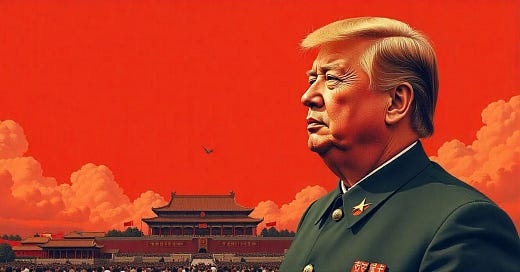



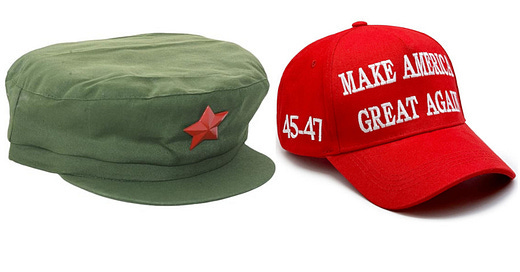

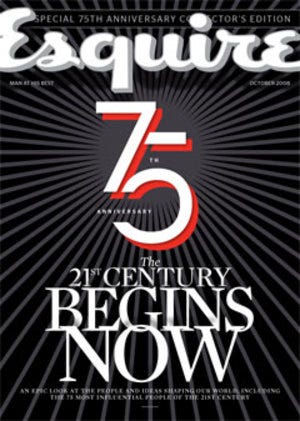
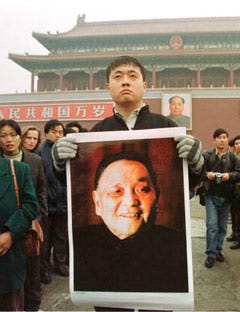
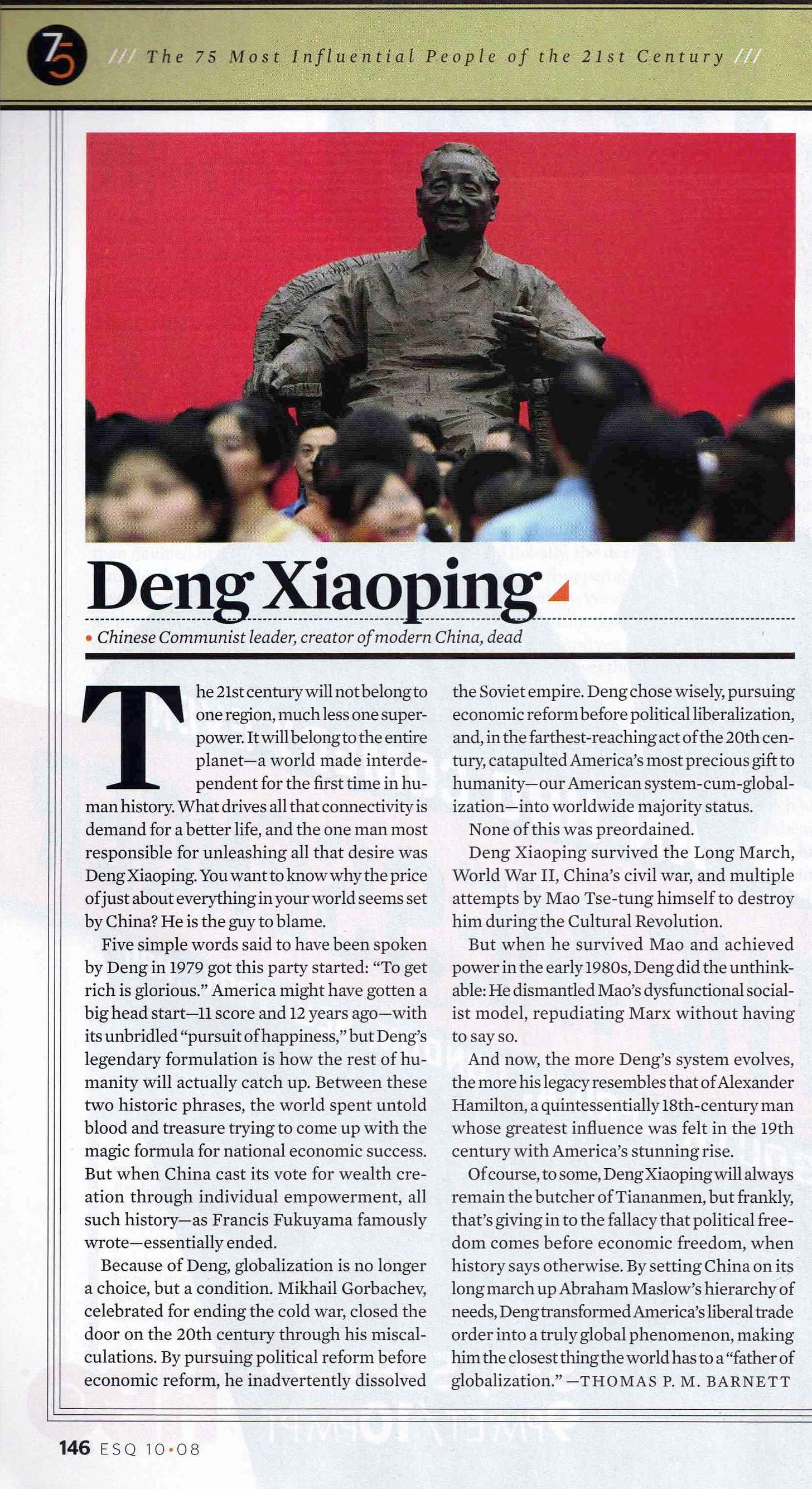


Calling what we're experiencing a "cultural revolution" is pretty accurate - not just in terms of the rejection of the last, oh, 150 years of American history and 'place in the world'-ness, but imposing a cultural value system that is wholly simulacrum. Baudrillard was right.
I guess the next question is what sort of Gang of Four trial the US will need to experience in the aftermath of 2028.
Mao? Maybe Xi instead as he too has bent the party and the government to his will